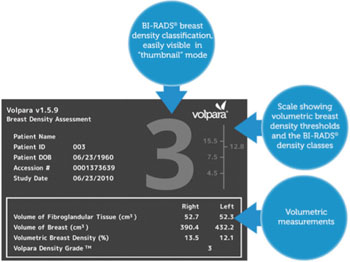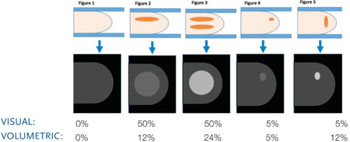Software Streamlines Mammography System Workflows from Multiple Manufacturers
By MedImaging International staff writers
Posted on 13 Aug 2014
A prospective study conducted by the Swedish researchers has confirmed the effectiveness of a breast imaging software across multiple vendor platforms, and has linked volumetrically evaluated breast density measurements to breast cancer risk. Posted on 13 Aug 2014
The findings were published online July 10, 2014, in the journal Cancer Epidemiology, Biomarkers & Prevention. “Mammographic density is a strong risk factor for breast cancer and an important determinant of screening sensitivity,” said Prof. Per Hall from the Karolinska’s Institute (Stockholm, Sweden) department of medical epidemiology and biostatistics. “Since the widespread application of mammographic density is highly dependent on the accuracy and reliability of its measurement, we studied the performance of VolparaDensity [developed by Volpara Solutions; Wellington, New Zealand] in a large prospective cohort study,” he explained. “This is the first large-scale study associating VolparaDensity’s assessment results with breast cancer risk.”
KARMA (KARolinska MAmmography project for risk prediction of breast cancer) is a prospective cohort study initiated in January 2011 and comprises 70,876 women attending mammography screening or clinical mammography at four hospitals in Sweden. Digital mammography was performed using five different models from three manufacturers (GE Medical Systems (Chalfont St. Giles, UK), Philips Healthcare (Best, The Netherlands), and Sectra Imtec, AB (Linköping, Sweden).
Volumetric breast density was measured for each participant using VolparaDensity. Study participants also donated blood for genotyping and filled out a detailed questionnaire. The findings demonstrated that in a high-throughput envirnoment, VolparaDensity performs well and in accordance with the behavior of established density measures. Volumetric density was positively tied to nulliparity, age at first birth, hormone use, benign breast disease, and family history of breast cancer, and negatively, with age and postmenopausal status. Significantly, the technology demonstrated good agreement by side and by view, and distributions of volume density were similar across the diverse mammography systems. Based on the results, researchers concluded that automated measurement of volumetric mammographic density using VolparaDensity is a promising tool for widespread breast cancer risk assessment.
“One of the limitations of current screening strategies,” according to Volpara solutions chief scientist and CEO, Dr. Ralph Highnam, “is that they are based solely on age, ignoring the fact that a woman’s lifetime risk is determined by other common risk factors. After age, mammographic density is the strongest breast cancer risk factor. As a result of the Karolinska’s study, VolparaDensity’s volumetric assessment of mammographic density is continuing to display its promise as a highly effective tool for optimizing screening programs where resources and extra imaging modalities can be targeted to those with the highest density. The KARMA study is one of the best organized and most exciting studies that we are participating in globally. This validation of VolparaDensity for consistency is a great starting point for a whole range of projects we aim to complete with KARMA as we pursue our joint aim of reducing the mortality and incidence of breast cancer.”
Cleared by the US Food and Drug Administration (FDA), HealthCanada, Australia’s Therapeutic Goods Administration (TGA), and European CE-marked, VolparaDensity is used by radiologists to objectively assess density from both digital mammography and tomosynthesis images to help clinicians evaluate who might benefit from additional screening.
Highly correlated to breast MR assessments, VolparaDensity is an effective application that automatically generates an objective measurement of volumetric breast density correlated to the American College of Radiology (ACR) breast density categories. Up to now, more than three-million women have had their breast density analyzed, using VolparaDensity. The software is part of a range of quantitative breast imaging tools built on the VolparaSolutions algorithm that allows for personalized measurements of density, patient dose, breast compression, and other factors designed to help maintain accuracy and consistent quality in breast screening.
The Karolinska Mammography Project for Risk Prediction of Breast Cancer (KARMA) is creating the world’s best-characterized breast cancer cohort. The goal is to reduce the mortality and incidence in breast cancer through translational research focusing on breast cancer prevention. The Karma project is conducted in close collaboration with four hospitals in Sweden, Södersjukhuset, Helsingborg, Landskrona, and Lund.
Related Links:
Karolinska’s Institute
Volpara Solutions
















